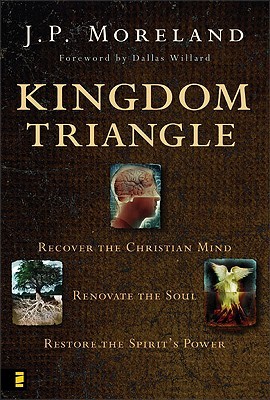Interview with J. P. Moreland
 The Pneuma Review editorial committee is excited about a new book by J. P. Moreland called Kingdom Triangle: Recover the Christian Mind, Renovate the Soul, Restore the Spirit’s Power. After Dr. Moreland agreed to interview with us, we wrote to him:
The Pneuma Review editorial committee is excited about a new book by J. P. Moreland called Kingdom Triangle: Recover the Christian Mind, Renovate the Soul, Restore the Spirit’s Power. After Dr. Moreland agreed to interview with us, we wrote to him:
The mission of the Foundation is “to lead Pentecostal/charismatic believers to a greater understanding of God’s Word and assist church leaders in equipping the saints for the work of the ministry. We also long for greater dialogue between Evangelicals about doctrine, and by way of an open forum, to promote Biblically-centered theological discussion on the gifts of the Spirit.” We appreciate how the Lord is using you to carry out a similar mission and we are encouraged by your efforts.
Thank you for taking this opportunity to have an informal interview with us to explore some of these thoughts in greater depth. Kingdom Triangle is a particularly challenging book. Those of us on the editorial committee that have been reading it know we need to finish it if we have not already. Your book has already sparked many conversations for us, and we would be delighted to work with you in the future as your schedule permits.
The Pneuma Review: Why did you write Kingdom Triangle?
J.P. Moreland: I have been burdened by the low quality of spiritual competence in the American church and the small impact we are having compared to our numbers. I believe a focus on cultivating the three legs of the Kingdom Triangle lies at the heart of the way forward.
PR: What are some practical things church leaders can do to encourage a restoration of the Christian mind?
JP: I lay out a strategy in Kingdom Triangle in this area, but two things stand out: 1. We need occasions where more serious intellectual teaching, preaching and discussion takes place in the church calendar. This needs to be a stated goal of the church. 2. Book reviews, reading groups, CD discussion groups, all need to be more visible in the church’s life and values.
PR: Why is academic learning not enough to develop a Christian mind?
JP: Because of two factors. First, a Christian mind is interested in wisdom and not simply knowledge, though the latter is important for the former. Today, academic learning is completely removed from the task of forming wise, virtuous people who know how to live well. Second, the Christian mind is interested in cultivating the habit of focusing on God more and more throughout each day and that is not an academic matter.
PR: What difficulties are there for teachers in the church if they adopt a postmodern worldview?
JP: It will be difficult to get people to internalize important differences between the Way of discipleship and the values and lifestyles of the culture. Postmodernism tends to be an accomodationist approach at its heart. Further, postmodernism is weak on truth, knowledge and appropriate authority in one’s life. These are all central to the Christian life.
PR: In your chapter “Renovation of the Soul,” you say that “the Sunday morning service was never intended to be the staple for growing world-changing communities or for producing radically different people under the shelter of God’s wings” (143). What can church leaders do to better equip the whole body for ministry, especially if they are finding it difficult to move away from centralized leadership?
JP: Two things. First, leaders should concentrate more time on fewer people—intensify the training and discipleship of a core group in the church who will themselves carry out the work of the church. Second, there should be times for intense spiritual formation—entire days of prayer and worship, emphasis on home groups that can intensify personal relationships and spiritual formation in a more accountable, relational context.
PR: What is lost when the good news of the Kingdom is shared unaccompanied by the Spirit’s power?
JP: We lose the ministry of Jesus. He taught, proclaimed and demonstrated the Kingdom’s power and we should, too. We also lose the distinctively supernatural aspects of our religion. Finally, we lose intimacy with God because the power and presence of God are often two sides of the same coin in scripture.
PR: In Kingdom Triangle, you give some advice about how churches can encourage growth in the miraculous. Have you seen these ideas work out in churches newly open to the contemporary ministry of the Spirit?
JP: I have seen this. What is important is for each church to locate where they currently reside regarding these issues and be who they are, yet with an eye on growing a bit in this area. Then each church must be willing to take some risks and step out in faith such that God may not show up but if He does it will be obvious. Finally, each church must learn from its failures and continue to go forward.
For further reading, visit the Kingdom Triangle Discussion Forum: www.kingdomtriangle.blogspot.com
Be sure to read the review by W. Simpson of Kingdom Triangle in this issue.
Category: Living the Faith, Pneuma Review, Spring 2008


